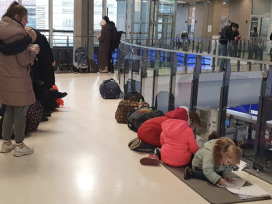
A leading Ukrainian-American writer on grace, justice, power and freedom.
If all Serbs are to blame for what one Serb did, how are we to treat ‘tough but fair’ Europe, which, according to Slavenka Drakulic, rightly punishes Serbian students for the politics of their parents’ contemporaries?” asks playwright and slam poet Milena Bogavac.
It’s nice, oh it’s so nice to be a stickler for morality, to believe in the immaculateness of one’s own attitude and to be ready to accept your own interpretation of history as the only one possible, as true and just. This is how a teenager who later became my grandfather must have felt when he ran away to become a partisan. This is how Adolf Hitler must have felt at the very beginning of his career.
This is how Ratko Mladic must feel, while he drinks a cold beer “with his own people”, without thinking about me and the fever I caught while queuing for my visa. I believe that this is how Slavenka Drakulic feels. In a way I envy her, because, unlike me, she doesn’t sound confused at all.
She walks down Mariahilferstrasse, and afterwards she notes down sentences by non-nationalist authors that she doesn’t like. I don’t know what I don’t like, while I’m walking on the slippery Belgrade streets covered with snow trying not to break my neck, minding my own business, without any ambitions to change the world.
Since I was asked to make a comment on Slavenka’s article from a point of view of a young artist, with a certain generational and aesthetic position in society, I would like to inspect it closely as a (post-)dramatic monologue. It seems to me that it is suited for a stage, because it perfectly illustrates a particular type of woman, characteristic of our postwar society. I would call that type of woman, not without sympathy, a do-gooder. Someone else would use a trite phrase about “foreign” and “domestic”… Yet another would loudly applaud the author while sitting in their NGO box… However when the play is over, we’ll all go and grab a beer and it should be a cold one, because a warm one goes fast to your heated head. And it’s nice, oh how nice it is when it boils in your head! Intoxicated with beer, they are intoxicated with an idea too, and are ready to do anything. Wars are an invention of intoxicated people, regardless of their nationality. That is why I try to remain sober.
I am analysing the article aesthetically and not ethically, and therefore I have no problem inserting a sentence about a cold beer while writing about refugees. In writing, it could be describes as a process of making it all sound less pathetic, and for a writer who grew up in war, every kind of cynicism feels intimate and likeable. Cynically, therefore, I remark that Serbian ethnic cleansing in Kosovo was very thorough.
They cleansed themselves. A similar thing happened in Croatia, too, and an even more drastic exodus is happening now, in the heart of beautiful and sad Serbia. Starting with the general trend of media disgust with the term “Serb” up to statistics on birth rates, which put us under nations that are in danger of dying out, it seems that Serbia is turning into Kosovo: ethnically cleansed of Serbs…
If all Serbs are to blame for what one Serb did, how are we to treat “tough but fair” Europe, which, according to Drakulic, rightly punishes Serbian students for the politics of their parents’ contemporaries? Generalization is the mother of intoxication. To discuss the collective guilt of the Serbs while the Earth grows red-hot and the economy suffers a severe breakdown achieves even less than contemplating “which came first, the chicken or the egg?” It achieves less than to grab a cold beer from the fridge and, with philosophical calm, watch how this world, intoxicated with vanity, is going to hell… Oh how nice that is!
Published 3 April 2009
Original in Serbian
Translated by
Alma Memic-Avdic
First published by Politika 28.03.2009 (Serbian version)
© Milena Bogavac / Eurozine
PDF/PRINTSubscribe to know what’s worth thinking about.

A leading Ukrainian-American writer on grace, justice, power and freedom.

Remaining in a new country or returning home? The Knowledgeable Youth podcast delves into the complex decision-making refugees face when migrating, together with researcher Olena Yermakova.